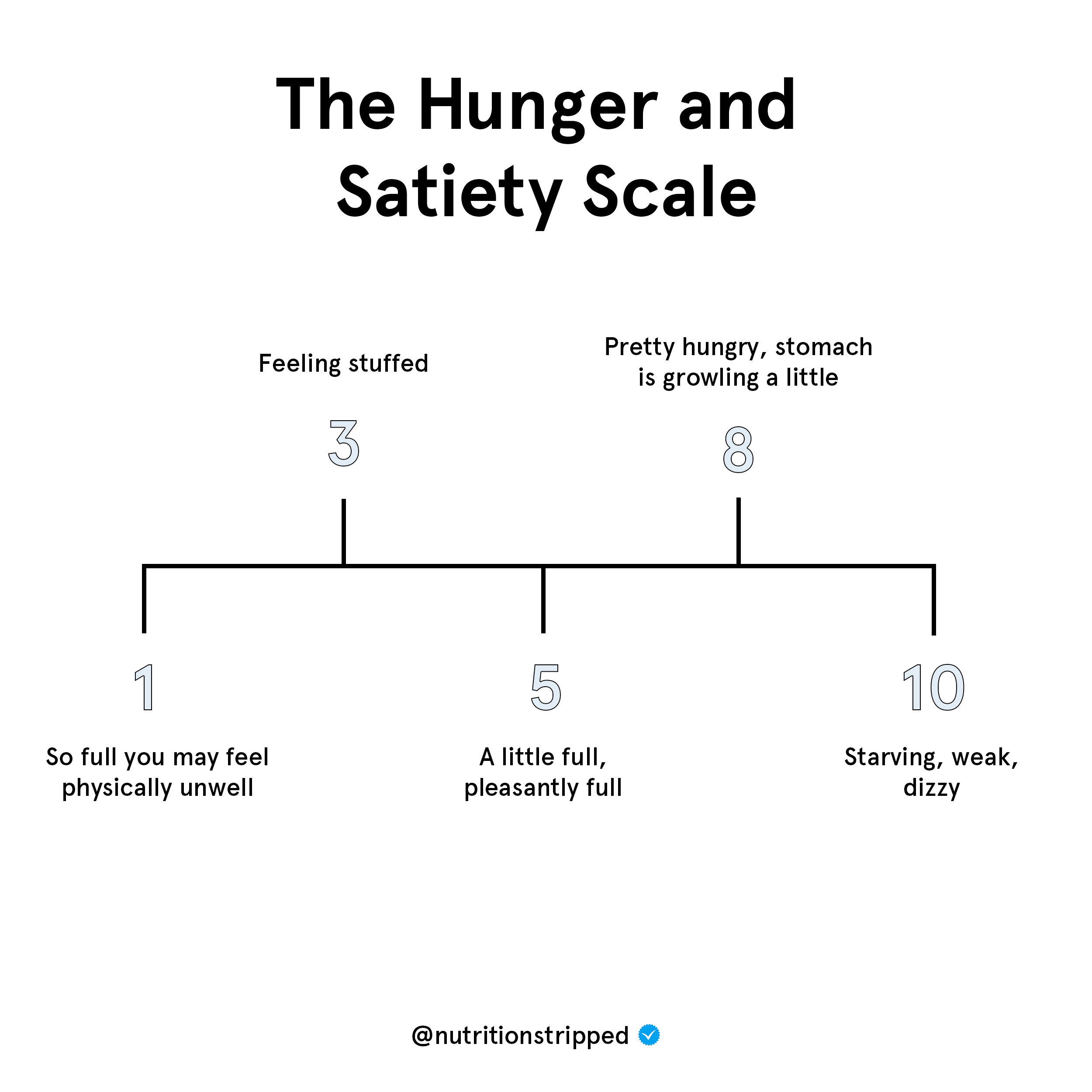Learn why understanding hunger signals may be the key you need to maintaining balanced eating habits.
Hunger signals are your body’s way of telling you that it needs energy. Your body uses hunger signals to communicate with you throughout the day, every day. We feel different degrees of hunger, satiety, and fullness as a result of our nourishment needs, activity levels, and so much more.
Being in tune with your hunger signals helps you to make food choices based on your unique needs. It also helps you to understand when factors outside of hunger are influencing your desire to eat, such as your emotions or environment.
Let’s dive into why understanding hunger signals are so important, as well as how you can get started today.
Why Tuning Into Your Hunger Signals Is Important For Lasting Healthy Eating Habits
Learning to listen to your body is just as important as learning how to build balanced meals. Let’s go through my top five reasons why listening to your hunger signals is so important, together.
1. Your Hunger Signals Tell You What Your Body Needs
Your hunger signals are your body’s way of telling you what it needs to feel and function at its best. This may be that it needs more energy (feeling hunger) or that the portion of food you ate was too much (feeling overly full).
Food is the body’s primary energy source. It’s what allows us to think clearly, build muscle, pump blood, breathe air, and do so much more. While we’re all performing these human functions on a daily basis, we’re doing so in a slightly different way, we’re all a bit unique.
This is why hunger cues are so important. If the body is undergoing stress, fighting an infection or disease, performing physical labor, or engaging in more or less movement than normal, your body’s energy needs will differ. Your hunger signals reflect these needs.
2. They Guide Your Portion Sizes
As you become more familiar with your body’s own unique hunger cues, you’ll learn how to make choices that work best for you. The portion sizes you need change day-to-day and meal-by-meal based on what your body needs and what you have (or have not) eaten.

3. Hunger Signals Help You Navigate Emotional Eating
Many times, factors outside of our hunger can influence our food choices. As Registered Dietitians, one of the most common factors we hear about is emotional eating. Emotional eating is when your emotions — anything from boredom to stress or grief — are guiding what, when, and how much you eat, rather than your physical hunger signals.
When you’re in tune with your hunger signals, you’re better able to identify when you’re truly hungry or when your emotions are causing you to reach for food for comfort. You’re then able to address your emotions directly, as opposed to emotionally eating in response.
4. They Prevent Boredom Eating
Boredom eating is what we call “head hunger.”
When we’re bored, it’s common to mindlessly reach for snacks or sweets out of habit. Eating is fun, so it seems like a perfecty logical choice! But over time, this can lead to bouts of mindless eating, overeating, and sometimes even binge eating.
By practicing using your hunger levels, you can identify when you’re doing this and instead choose another enjoyable activity to fill your time.
5. Hunger Signals Help You Notice Situational or Environmental Triggers
Another situation where we tend to eat aside from being physically hungry is when we’re exposed to a certain environmental or situational cue.
An example of an environmental trigger may be seeing cookies or bags of chips at the office in the break room. When you pass by, you might subconsciously eat them even when you don’t truly want them, simply because they’re there.
A situational trigger, on the other hand, might include something like dining out. When ordering food at a restaurant, the portion on the plate is the same for everyone who orders that entree. There’s really no individuality here! So as you’re eating at a restaurant, you may be more inclined to finish your plate, even if you’re only hungry enough for half of what was served.
Checking in with your hunger signals before you eat can help you identify if you’re actually hungry, or if the environment or situation you’re in is influencing your decision of what to eat or how much to eat.
Measuring Your Hunger Signals
Throughout the day (before meals, during meals, and after meals), take note of where you are on the hunger and satiety scale. We dive into the details of this much more in-depth in the Mindful Nutrition Method and our Wellness Coaching, but for now, think about this scale on a 1-10 spectrum, where one is totally stuffed, and 10 is completely famished.
No matter where you fall on the scale, approach this practice with compassion. It’s okay if you overate or if you went too long without eating. It happens to us all!
This practice is designed to help you bring awareness to why that might be, how you feel when that happens, and how you may need to adjust moving forward. With practice, you’ll be able to better understand what your body wants and needs and make choices that align with what it’s asking for.

Is It Okay to Eat When I’m Not Hungry?
You may be surprised to hear this, but absolutely! There are plenty of reasons to eat even when you aren’t hungry. This may be enjoying dessert after dinner or eating to give your body nourishment even if something like stress is suppressing your hunger.
With mindful eating, it’s all about having heightened awareness of why you’re eating so you can choose the best option for you at any given moment. You may say to yourself, “I’m not that hungry, but I would actually enjoy that dessert right now.”
On the other hand, you may say, “I notice that I’m not actually hungry, but I really want a snack. I think it’s because I’m bored right now. What could I do instead?”
Whatever it may look like for you, this awareness can help you make intentional, mindful choices.
Start Practicing Using Your Hunger Signals
Now, it’s time for you to put this into practice. At your next meal, stop to check in with yourself and see where your hunger levels are. This might be challenging at first, so be patient with yourself as your practice and learn.
Do You Want to Experience More Balance with your Food Choices?
Then find your balanced eating type!
Take this 45-second free quiz to find out which balanced eating archetype you are, and what your unique type needs to maintain balance with the way you nourish yourself. That way, you can finally be free from food and diet obsession, maintain a balanced weight, and cultivate a positive relationship with food and your body.
Take The Free Quiz Now
The post Why Hunger Signals Are Important To Understand And Use appeared first on Nutrition Stripped®.
McKel (Hill) Kooienga
Comments
Post a Comment